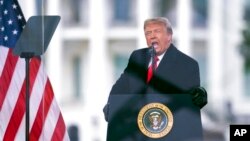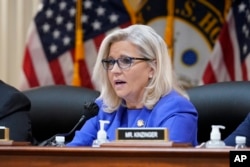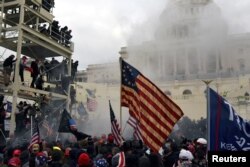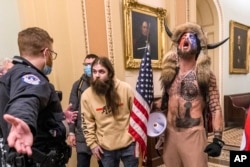One of the key lawmakers investigating the January 6 riot at the U.S. Capitol last year says that if the Justice Department concludes that former President Donald Trump fomented the mayhem to block Congress from certifying his 2020 reelection loss — it should not hesitate to prosecute him.
Congresswoman Liz Cheney, the vice chairperson on the panel investigating the insurrection and a vocal anti-Trump Republican, acknowledged to ABC News that the prosecution of a former U.S. president would be unprecedented and “difficult” for an already politically divided country.
But the Wyoming Republican said that not prosecuting Trump, if it were warranted, would be a "much graver constitutional threat" for the United States. Trump, a Republican, lost to Democrat Joe Biden, but to this day claims that vote-counting irregularities cost him a second four-year term in the White House.
In an interview last Wednesday that was broadcast Sunday on the “This Week” show, Cheney said that “if a president can engage in these kinds of activities, and the majority of the president's party looks away; or we as a country decide we're not actually going to take our constitutional obligations seriously, I think that's a much, a much more serious threat" than prosecuting him.
"I really believe we have to make these decisions, as difficult as it is, apart from politics. We really have to think about these from the perspective of: What does it mean for the country?" she said.
"There's no question that he engaged in high crimes and misdemeanors. I think there's no question that it's the most serious betrayal of his oath of office of any president in the history of the nation. It's the most dangerous behavior of any president in the history of the nation," she said.
Asked whether the committee could make a referral to the Justice Department for prosecution of Trump and others, Cheney said, "Yes," while adding that the Justice Department "doesn't have to wait" for the panel to act. She said the committee could issue "more than one criminal referral,” including for possible witness tampering by former Trump aides trying to influence witnesses to stay loyal to Trump as he weighs a campaign to try to reclaim the presidency in the 2024 election.
The Justice Department is in the midst of an ongoing wide-ranging investigation of the riot but has not said it is specifically targeting Trump.
Cheney offered her thoughts a day after she led two hours of questioning Tuesday of Cassidy Hutchinson, a former top aide to Trump’s last White House chief of staff, Mark Meadows.
Hutchinson, 25, gave an explosive behind-the-scenes account of Meadows’s and Trump’s actions before and during the January 6, 2021, storming of the Capitol by about 2,000 Trump supporters.
She told lawmakers how Trump became angrier and more volatile as the reality of his election loss set in and he realized that despite his private and public entreaties, former Vice President Mike Pence would not agree to upend the election outcome and send the results in several key states Trump narrowly lost back to their state legislatures so they would name electors supporting Trump to replace those legitimately chosen to vote for Biden in the Electoral College.
She testified that Trump was told ahead of a rally near the White House before the riot at the Capitol unfolded that some of his supporters were armed and equipped with body armor and yet urged them to “fight like hell” to upend the election outcome.
She said that a Meadows aide told her that Trump was angered that his Secret Service security detail would not drive him to the Capitol where his supporters were massing before storming into the Capitol. In one moment disputed by the Secret Service, Hutchinson said Trump tried to grab the steering wheel from a security agent and demanded he be driven to the Capitol.
As some of the rioters chanted “Hang Mike Pence!” — she said Meadows told her that Trump approved of the sentiment, saying his No.2 in command deserved to be hanged. Some unknown Trump supporters had erected a gallows on the National Mall within eyesight of the Capitol.
Trump has worked to disparage Hutchinson’s testimony, posting on social media that "I hardly know who this person ... is, other than I heard very negative things about her.”
"She is bad news!" he added.
In the ABC interview, Cheney said she was "absolutely confident" about Hutchinson’s testimony, saying, “She's an incredibly brave young woman."In the United States, presidents are effectively chosen in separate elections in each of the 50 states, not through the national popular vote. Each state’s number of electoral votes is dependent on its population, with the biggest states holding the most sway. The rioters who stormed the Capitol tried to keep lawmakers from certifying Biden’s eventual 306-232 victory in the Electoral College.
At the heart of Trump’s effort to stay in power was an audacious plan espoused by a key Trump lawyer, former New York Mayor Rudy Giuliani, and conservative lawyer John Eastman, to get legislatures in states Trump narrowly lost to appoint new electors supporting him to replace the official ones favoring Biden.
While the House committee cannot bring criminal charges, the Department of Justice is closely monitoring the hearings to determine whether anyone, Trump included, should be charged with illegally trying to reverse the outcome of the 2020 presidential election.
No U.S. president has ever been charged with a criminal offense after leaving office.
Trump has often derided the nine-member House of Representatives panel investigating the riot at the Capitol and attacked its witnesses who have painted a highly unfavorable account of his postelection pressure campaign to stay in office against repeated findings of his own key aides, including former Attorney General William Barr, that there was no evidence of fraud sufficient to overturn the election outcome.
The investigative panel is comprised of seven Democrats, Cheney and another vocal Republican critic of Trump, Congressman Adam Kinzinger.
Cheney said, "I think you will continue to see in the coming days and weeks additional detail about the president's activities and behavior” on January 6 last year.
In one of the hearings set for later this month, the committee is exploring how Trump watched the riot unfold on television for more than three hours while rejecting pleas from aides and his elder daughter, Ivanka, a White House adviser to him, to publicly urge to rioters to leave the Capitol.
More than 800 of them have been arrested and more than 300 have pleaded guilty to an array of criminal charges or been convicted at trials and handed prison terms of a few weeks to more than four years.







